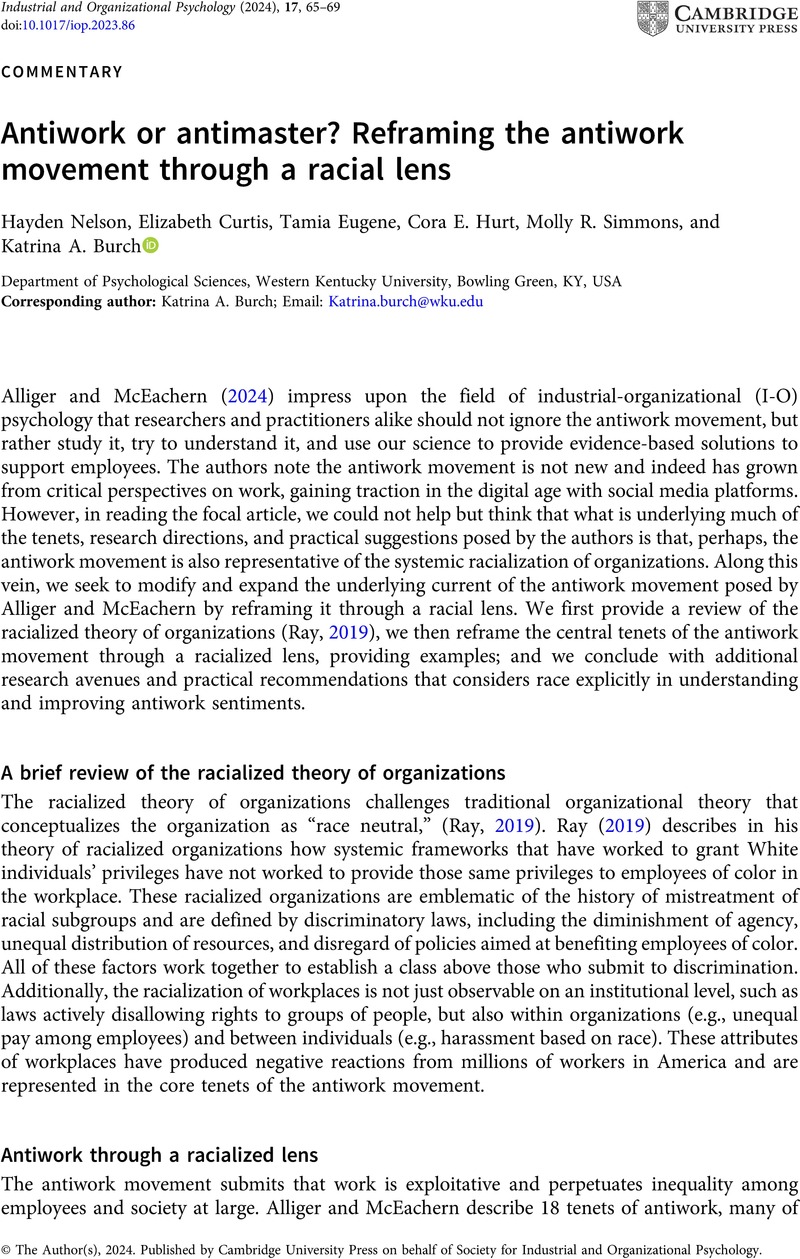No CrossRef data available.
Article contents
Antiwork or antimaster? Reframing the antiwork movement through a racial lens
Published online by Cambridge University Press: 07 March 2024
Abstract
An abstract is not available for this content so a preview has been provided. Please use the Get access link above for information on how to access this content.

- Type
- Commentaries
- Information
- Copyright
- © The Author(s), 2024. Published by Cambridge University Press on behalf of Society for Industrial and Organizational Psychology
References
Alliger, G. M., & McEachern, P. J. (2024). Antiwork offers many opportunities for I-O psychologists. Industrial and Organizational Psychology, 17(1), 1–30.Google Scholar
Dickerson von Lockette, N., & Spriggs, W. E. (2016). Wage dynamics and racial and ethnic occupational segregation among less-educated men in metropolitan labor markets. Review of Black Political Economy, 43, 35–56. https://doi.org/10.1007/s12114-015-9222-5.CrossRefGoogle Scholar
Fortner, M. J. (2023). Racial capitalism and city politics: Toward a theoretical synthesis. Urban Affairs Review, 59(2), 630–653. https://doi.org/10.1177/10780874211066627.Google Scholar
Greenhaus, J. H., Parasuraman, S., & Workley, W. M. (1990). Effects of race on organizational experiences, job performance evaluations, and career outcomes. Academy of Management Journal, 33(1), 64–86.Google Scholar
Jones Carney, C. J. Disengagement by a thousand cuts: The impact of microaggressions on employee engagement, 2021, Unpublished doctoral dissertation. University of Baltimore
Google Scholar
Kim, J. Y.-J., Block, C. J., & Nguyen, D. (2019). What’s visible is my race, what’s invisible is my contribution: Understanding the effects of race and color-blind racial attitudes on the perceived impact of microaggressions toward Asians in the workplace. Journal of Vocational Behavior, 113, 75–87. https://doi.org/10.1016/j.jvb.2018.08.011.Google Scholar
McLuney, C. L., Durkee, M. I., Smith, R. E. II, Robotham, K. J., &Lee, S. S-L. (2021). To be, or not to be…Black: The effects of racial codeswitching on perceived professionalism in the workplace. Journal of Experimental Social Psychology, 97, 104199. https://doi.org/10.1016/j.jesp.2021.104199.Google Scholar
Quillian, L., Pager, D., Hexel, O., & Midtbøen, A. H. (2017). Meta-analysis of field experiments show no changes in racial discrimination hiring over time. Proceedings of The National Academy of Sciences of The United States of America, 114(41), 10870–10875. https://doi.org/10.1073/pnas.170625511.Google Scholar
Ray, V. (2019). A theory of racialized organizations. American Sociological Review, 84(1), 26–53. https://doi.org/10.1177/0003122418822335.Google Scholar
Robinson, C. J. (2000). Black Marxism: The making of the Black radical tradition. University of North Carolina Press.Google Scholar
Santiago, R., Nwokoma, N., & Crentsil, J. (2021). Investigating the implications of code-switching and assimilating at work for African American professionals. Journal of Business Diversity, 21(4), 72–81.Google Scholar




